| |
|
The platform RESEARCH ARTS collects and discusses new approaches and research models proposed by a growing research community of artists, scientists, engineers and interested citizens. The "Themes or Projects of the Month" of the e-Journal aim to foster a research agenda in this field, and to contribute towards a more sustainable and equitable society.
More Information about the four areas of research and activity >>
|
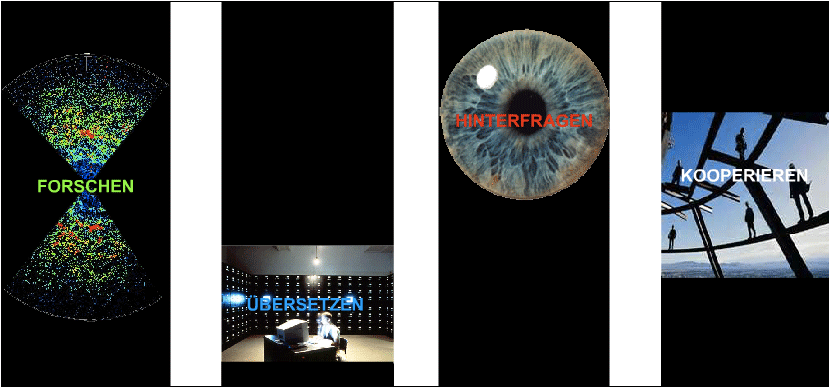
|
|
|
|
|
|
|
|
|
'(Inter)connected" Trees | 'Arbres (inter)connectats'
at Batecs Festival
“I felt a big difference between standing next to the field of olive trees at the beginning and later in between of the olive trees once they had been interconnected with cloth yarn. As I stepped into this colorful fabric yarn net, I immediately felt woven into all these connections between the trees, I became part of it. Becoming aware of my connectedness felt very invigorating,” said one attendant of the participatory landscape intervention.
'Arbres (inter)connectats' was specially created for the first edition of the Festival Batecs – immersed in the Mediterranean landscape of Font-rubí (Catalonia) – by Stella Veciana in collaboration with Eulàlia Valldosera, Barbara Meneses, Carlaina Fahle, Ralf Hilgers, Rosa Martí and Glòria Garriga, and with the engaged participation of several festival-visitors.
soon more >>
|
|
|
|
|
|
|
|
|
Resonating impressions of documenta 15
documenta 15 exhibition was curated by the ten-person, Jakarta-based collective ruangrupa, that invited further 14 core collectives who, in turn, extended that invitation, resulting in a reported 1,500 participants, mostly based in the Global South. How do you describe such an art event created by a collective of collectives? A video collection by ruangrupa, which documents their cooperative (art) practice in the multidisciplinary platform Gudang Sarinah Ekosystem and the public-sustainable learning space Gudekul, provides some clues to the exhibitions' creation.
Although words and contents dominate this exhibition, the meta-collective and artistic Lumbung of the documenta 15 maybe is capured best by images of some resonating and enduring impressions. These include the (1) kinetic installation or performance "Sweep Walkers" and "Black Masks on Roller Skates" with 'breathing' terrariums, which have developed from the artist's family history of street sweepers and powada singers attempting to free from the Indian caste tradition (Amol K Patil), an (2) intimate video "I feel everything" inspired by collaborative revisited folktales about our relation with nature, focusing particularly on endangerd water sources (Jumana Emil Abboud), the (3) five-channel video installation "Pila" showing the neverending waiting in line for 500 grams of rice (Kiri Dalena), or a (4) multimedia installation "And They Die a Natural Death" with the changing sound of flutes and shadows of chili plants projected on the wall of a former torture chamber in the Rondell of Kassel that respons to the wind which is live transmitted from a chili forest near to former detention camp Tam Dao in Vietnam (Nguyen Trinh Thi).
more>>
|
|

|
|
|
|
|
|
|
|
|
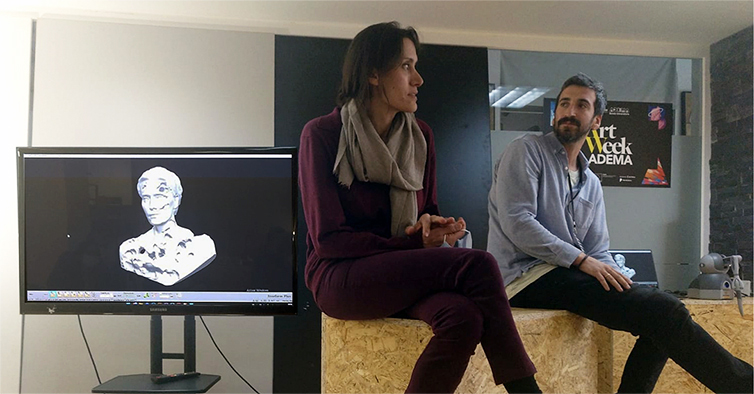
|
|
Amparo Sard presents at ARCO art fair the first "haptic NFT"
The artist Amparo Sard makes use of the technology of haptic and holographic 3D simulators to create a tactile, self-perceiving virtual self-portrait. A crank-like sensory device allows the users hand to feel the density and shape of the sculpture. Sutil vibrations simulate the perception of perforating the artist's virtual bust. This type of virtual simulator is usually used in dental classes to train students' manual dexterity.
It is the first cryptographically recorded art work NFT (Non-Fungible Token) that can be tactilely perceived, creating a new artistic field of sensory research in virtual environments.
more >>
|
|
|
|
|
|
|
|
|
|
|
I International Art Week - ADEMA
The ADEMA University School in Palma de Mallorca is a center affiliated with the UIB (Universitat de les Illes Balears) that will offer its own degree in Fine Arts from September 2022. The national accreditation agency (ANECA) recently gave the green light for the new degree.
In addition, in March 2022, ADEMA celebrated its
"I International ART-Week", with the aim of creating active networks with various European universities and creative synergies among artists of all genres right from the start-up phase. The organizers were very pleased with the great response to the lectures and workshops from the participating students, professors, artists, gallery owners and industry professionals.
more >>
|
|
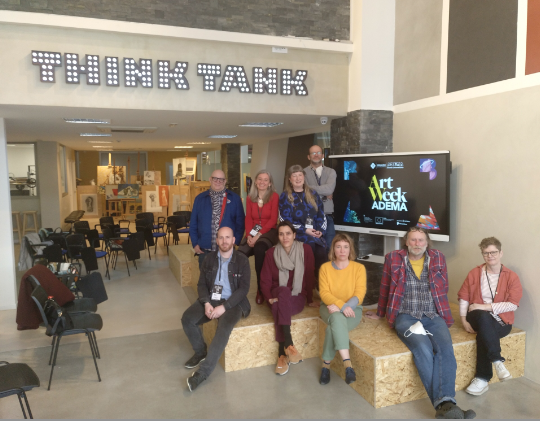
|
|
|
|
|
|
|
|
|
|
|
My art acts on society like...
"My art acts on society like... a plant - it draws it's strength from the dark, the hidden, and orients itself to the light." (Alexandra Seel)
The short film shows different artists and their artistic form or strategy of acting on society. For this, artists make use of words and objects. Their metaphorical use of objects feeds our imagination.
In this sensitive and poetic way, the short film explores the potentials and challenges of art committed to inducing systemic social change.
|
|
|
|
|
|
|
|
|
Living in sustainable villages – Ecovillages as catalysts of sustainable rural development
The global eco-village network GEN has been supporting sustainable regional and village development for over 20 years. The project attempts to make the methods and educational formats collected from around the world available in partnership-based village cooperations (in Baden-Württemberg, Hesse, Lower Saxony, Thuringia and Saxony-Anhalt).
Via an innovative and holistic approach the aim is to inspire and encourage the participating as well as other rural communities to find their own path towards more sustainable futures.
more>>
|
|
| |
|
|
|
|
|
|
|
|
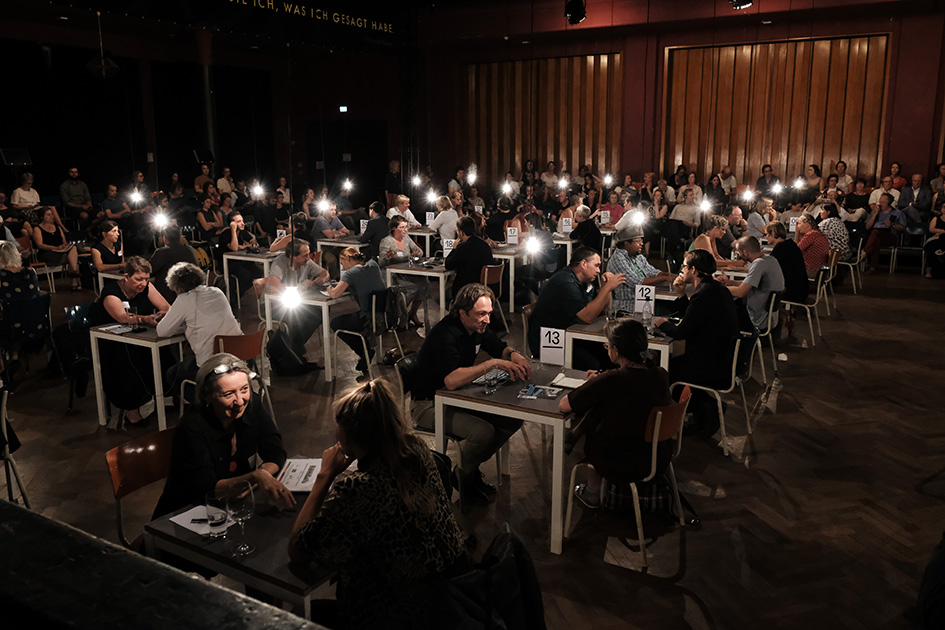
|
|
„How to talk about the rural?“ - Topic of the "Blackmarket for Knowledge and Non-Knowledge"
On September 19, 2018, the "Blackmarket for Knowledge and Non-Knowledge" opened the TRAFO Ideas Congress of the German Federal Cultural Foundation in Halle. The black market was created by the artist Hannah Hurtzig as "a show and production space in which narrative formats of knowledge transfer are negotiated".
In a "living" archive installation, visitors can book 30-minute individual sessions with experts or join individual discussions via headphones via the black market radio. In this black market, 60 experts have their knowledge, their forward-looking projects and their stories about the Topic "rural perspective" offered.
more>>
|
|
|
|
|
|
|
|
|
|
|
"From Databases to Life Stories"
The short film "From Databases to Life Stories" was developed for the exhibition "Public Library" which took place at the America Memorial Library in Berlin. Since 2002, the meticulous investigation of looted books that were appropriated by German libraries during the Nazi era allows for their continued return.
Through personal interviews, the short film investigates and brings to light the experiences and family destinies of three exemplary cases that were hidden behind the functionality of databases of looted books. How are the books returned? What emotions come up to the heirs, when they get a book from a deceased relative? The short film reflects on the effects that restitution entails for the heirs and their environment, becoming a testimony of social memory and societal transformation.
more >>
|
|
|
|
|
|
|
THE FOUR RESEARCH ARTS AREAS OF ACTIVITY: |

|
Researching - into how we want to live and how we want to live together. Our world is one in which science and technology have more and more influence over public opinion and political decisions. What can a joint artistic and scientific approach contribute to sustainability research?
to the contents >> |

|
Translating - between the manifold languages of science, multiple perceptions of reality, diverse concepts of value and different forms of memory. How can we all understand each other? How can we translate, compare, communicate and archive our ever evolving fields of knowledge? What approaches would help us build bridges of understanding?
to the contents >> |
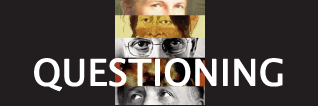
|
Questioning - the world we live in. How can we collaborate in shaping a sustainable future? How can science and art as social systems not only cooperate but also monitor themselves? How can we check our own research questions, methods of work and areas of impact?
to the contents >>
|

|
Cooperating - to encourage creative participatory processes between "experts from different disciplines" and the "experts of everyday knowledge". What can the RESEARCH ARTS community contribute to the transformation of global society towards one acting sustainably? How can we work together?
to the contents >>
|
|
* All copyrights of the images belong to the respective photographers who are mentioned next to the image in the corresponding article.
 
imprint | contact
|